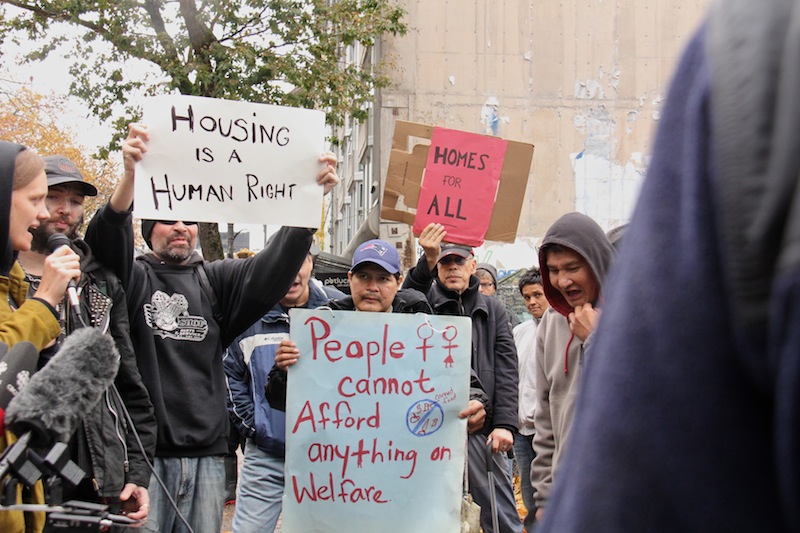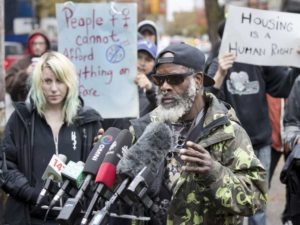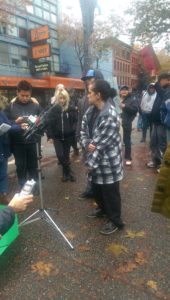
Nowhere to go – City of Vancouver files for an injunction to displace remaining 58 W Hastings Tent City residents
 On Tuesday, October 25th, the City of Vancouver issued a notice of trespass to the residents remaining at the 58 W Hastings Tent City. The statement posted to the tents notified the residents that “the City requires that the property is vacated and all belongings and tents removed no later than noon on October 25th, 2016.” Since then, city workers, cops and outreach workers have been on the site every day pressuring people to pack up and leave the site. One week later, on Wednesday November 2nd, the City filed for an injunction to remove 58 W Hastings Tent City entirely.
On Tuesday, October 25th, the City of Vancouver issued a notice of trespass to the residents remaining at the 58 W Hastings Tent City. The statement posted to the tents notified the residents that “the City requires that the property is vacated and all belongings and tents removed no later than noon on October 25th, 2016.” Since then, city workers, cops and outreach workers have been on the site every day pressuring people to pack up and leave the site. One week later, on Wednesday November 2nd, the City filed for an injunction to remove 58 W Hastings Tent City entirely.
The city doesn’t have a housing plan for the remaining residents of the tent city, and most of the residents have only been offered space at shelters. Yet most of the people that Carnegie Community Action Project organizers talked to were staying at the tent city precisely because they do not want to stay at shelters. Robert, a Cree man from Saskatchewan, who has been staying at the tent city for most of the summer says he rather be on the street than in a shelter. “Before I moved into the tent city I would stay up for 5-6 days in a row until I passed out from exhaustion. I didn’t want to stay at a shelter and be packed like sardines with 50 other men. I would rather live in a tent in Alberta, in 20 below, than at a shelter or at a SRO like the Regent or Balmoral.”

Many of the remaining tent city residents feel the same way about shelters. “Living is not just being thrown in a lump sum of people — that not many care about — and expected to be surviving and doing as well as others,” said another tent city resident Tazz Cummings, a resident who has been at the tent city since it started in July. “At least when I’m in my own tent, I can actually close my tent door and as thin as the walls are, I’m still private from the rest of the world.”
There are also many couples staying at the tent city, many of whom are staying there because they do not want to be separated in the shelter system. Joyce and Cory are one of those couples and they have been at 58 for over one month now. “In Surrey, we slept on the floor in a shelter and we were separated.” Joyce explains. “That’s why we don’t want to go back into shelters. Also, the shelter isn’t open until 9:30pm tonight so we have to walk around and be wet and then we have to leave at 7:30am in the morning.” Cory adds, “The tent city is a place that we can be together and when we’re tired we can go to sleep.”
Safety for whom?
The notice of trespass claimed that the “City is increasingly concerned about the conditions within the encampment and the safety of the individuals on the property.” Safety is the buzzword that the City hopes will justify the police displacement of 58 W. Hastings. People at the tent city, however, say they will be less safe when they are displaced from the site.
At the tent city people look out for each other. Robert explains how he woke up early one morning and found a man having an overdose in an alley behind the tent city. Robert didn’t have Narcan or a cellphone, so he woke up the remaining people in the tent city and everyone came to his assistance. The man survived, and only because there was a tent city community right there. Robert concludes that “he would been have been dead if no one was there.”
Robert explains that being poor and homeless is always unsafe, especially when you are Indigenous. “Most of us don’t live very long. I am 50 now and only 3 of my 10 best friends from my youth are still alive. I feel lucky to still be alive. I am terrified of getting old and defenceless, and I have no trust for the cops. The cops look at people like me like we are human garbage that don’t deserve to live.”
Robert thinks that homeless people are not to blame for unsafe conditions. When the first fall storm hit the tent city, a lot of tents flooded and people left. Since then conditions at the tent city have gradually deteriorated, but the city has not offered any support to clean up the site. Poverty pits people against each other. Robert elaborates, people are hungry, cold and feel stressed. Some people feel they have no option but to steal from each other to survive.
There is no housing
The City has offered housing to a select few at the site. But the fact is that that there is not nearly enough housing to offer all of the tent city residents. Hardly any new social housing is being built and market rental housing is scarce and unaffordable for people on welfare. All the rental units estimated to be vacant in Vancouver would only house half of the people who were homeless in the city, but almost none of those units are actually affordable to people on social assistance.
There are over a thousand people who are homeless in the Downtown Eastside, and thousands more who live in bed bug infested SRO hotels that are falling apart. Displacing the 58 W Hastings tent city won’t change this, it will only make survival harder for the people who are displaced.

Joyce and Cory don’t know where they will go next. A friend has offered the couch for a few nights, and after that they have to return to the street. When asked about where he was going next, Robert said, “Not sure where I am going to go. I try not to think about it. I am Indigenous, but I live like I am an unwanted visitor in Canada.”
The injunction hearing is scheduled for Thursday November 3rd, 9:45am at the Provincial Courthouse. Residents of the tent city did not have time to secure legal counsel so, while the City has its team of corporate lawyers to fight for their displacement, those affected will not have a legal defense. If granted, the injunction would allow the cops to use force to displace or arrest anyone who remains on the site of 58 W Hastings.
Considering that homeless residents of the tent city have nowhere to go, and housing is being offered to only a token few, the City’s looming arrests of homeless residents drives home Robert’s feeling that he is just an “unwanted visitor.” For so many who are homeless, Gregor “Ending Street Homelessness” Robertson has nothing to offer except criminalization and displacement.
